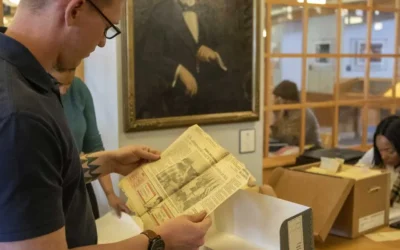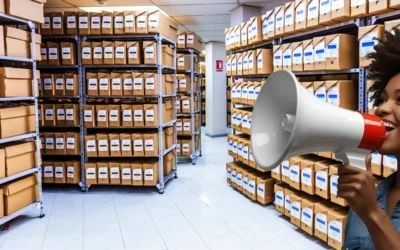Use Your Archival CMS to Enhance Description & Discovery
Margot Note
In addition to providing a structure that improves internal processes, an archival collections management system (CMS) should also support descriptive metadata authoring and encoding, streamlining the process of making collections discoverable.
Choose a software package that is compliant with a metadata schema appropriate for use with your type of institution and holdings.
The CMS should comply with archival standards, such as DACS, EAD, MARC, ISAD (g), and Dublin Core. It should also provide flexible support within the full hierarchical model—collections, series, containers, and items. Archivists can use as much of the hierarchy as necessary to provide the description level required for each collection. Selecting the appropriate metadata standard and a package that can use controlled vocabularies will narrow down the choices during the selection process for a CMS.
Change for the Better
Before selecting a CMS, revisit your collection’s documentation standards. Are procedures in place for processing items? Does the institution comply with professional standards when documenting the collections? If not, could the transition be an opportunity to standardize data? Since implementing or upgrading a CMS is a significant change to an organization, take advantage of the opportunity to improve holdings too.
Can you identify standard file formats and predict the associated file sizes to ensure that the CMS can manage the workload? Should the CMS batch import assets to streamline processing? These non-critical functions for the organization may be essential activities in the future. Depending on the organization, purchasing new capabilities may save time and money later.
Think beyond just replicating the current system and anticipate what the organization may need later. Choosing a CMS wisely involves more than resolving current problems; it is an opportunity to implement an infrastructure that opens the organization to new possibilities. Look for solutions that add value and prepare the archives to adapt to the future.
Developing Relationships
Investing in a CMS is also an opportunity to build partnerships and share knowledge. For example, a good vendor delivers a powerful CMS and supports it with sound client care. Look for a vendor to partner with, one who will understand your needs. As you research vendors, ask:
- Is the vendor well established? How long have they been in business?
- How well do they understand the archives community’s needs?
- Do they have experience in your collection type and size?
- How many other installations have they performed?
- Who are their clients? What can the clients share about the system and the support?
- What is the vendor’s approach to service?
- What are the implementation costs? What are the annual fees? What are the support costs? Are there additional costs for service upgrades?
If collaborating with a vendor as an organization or as a consortium, designate a liaison, so questions go through one person. In a consortium, ensure that everybody knows what is happening.
Plays Well with Others
Choose a CMS that interacts well with your other systems. Look for hardware with inclusive rather than exclusive support and system integration options. When you identify potential CMS options, share the list of each system’s requirements with the IT staff. What computer operating systems do your archives use? In addition to the main operating system, what other programs might need to interface with the CMS? To achieve optimal performance, bring the hardware and software vendors together for systems integration discussions. The CMS solutions will undergo a technical vetting process to avoid troubleshooting, retrofitting, or hardware replacement in the future.
Leveraging Change to Your Advantage
As you select the CMS for your organization, take the opportunity to improve processes and workflows for your archives. Along with your system requirements, also keep in mind considerations like ease of use, system integration, training and support options, and how the system will aid your institution, its mission, and its historical collections.
Margot Note
Margot Note, archivist, consultant, and author is a guest blogger for Lucidea, provider of ArchivEra, archival collections management software for today’s challenges and tomorrow’s opportunities. Read more of Margot’s posts, and register here for her upcoming webinar, Selecting Collections Management Systems: Know Your Options.
Similar Posts
Collaborative Archival Relationships
Collaborative projects are instrumental in showcasing how archival collections can benefit various organizational departments.
Informational, Evidential, and Intrinsic Values within Archives
Archives provide authentic, reliable information and hold values that reflect their functions and uses; informational, evidential, and intrinsic.
A Sustainable Archives
Archivists prioritize sustainable practices and policies, rooting their work in ethics of care, often preferring digital processing and preservation
Archival Branding and PR Strategies
Archivists who adopt branding and PR strategies both safeguard historical treasures and contribute to their organizations’ evolution.




Leave a Comment
Comments are reviewed and must adhere to our comments policy.
0 Comments